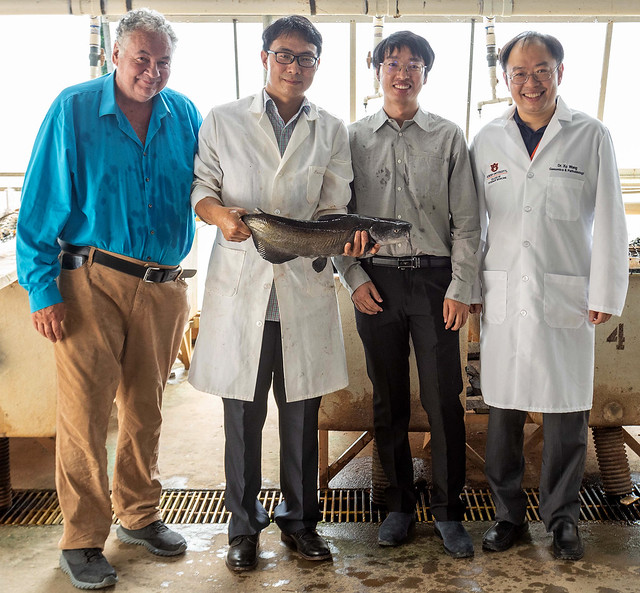Auburn University researchers first to map blue catfish genome
Article body
An Auburn University research team from the College of Veterinary Medicine and the College of Agriculture recently became the first to map a high-quality genome assembly of the blue catfish.
The genome, which was published in the journal GigaScience, is essential for genetic improvement using gene-editing or genome-assisted selection and will aid in the genetic enhancement of better catfish breeds for the multimillion-dollar catfish farming industry.
Catfish farming is the largest aquaculture industry in the U.S., accounting for approximately 70% of the nation’s total aquaculture output. Mississippi, Alabama, Arkansas and Texas account for the great majority of total U.S. freshwater catfish production, with Alabama ranking second only behind Mississippi. The primary fish utilized for farming purposes is a hybrid produced by breeding male blue catfish with female channel catfish.
“The hybrid catfish is superior in growth and disease resistance,” according to Xu Wang, assistant professor of comparative genomics in animal health in the College of Veterinary Medicine’s Department of Pathobiology and adjunct faculty investigator with the HudsonAlpha Institute for Biotechnology, who is one of the leaders of the project.
“Faster growth means more profit. Originally, farmed fish were primarily channel catfish, but three major bacterial pathogens resulted in a 40% loss of production and annual economic damage of over $100 million in the U.S. industry alone. The hybrid mix of the blue and channel catfish has improved disease resistance and reduced mortality by half.”
Even so, Wang says there is a critical need for further genetic improvement using genomic methods.
“The channel catfish genome was mapped in 2016 by John Liu’s lab at Auburn [now at Syracuse University], but the blue catfish genome was not available until we published it,” Wang added. “Our high-quality blue catfish genome addresses the urgent needs to achieve the long-term goal of improving growth, feed utilization, stress and disease resistance and reproduction.”
Wang served as senior author of the GigaScience paper, assisted by Haolong Wang (no relation), a doctoral student in biomedical sciences supported by both an Auburn Presidential Graduate Research Fellowship and a College of Veterinary Medicine Dean’s Fellowship. The veterinary researchers collaborated closely with a team from the College of Agriculture’s School of Fisheries, Aquaculture and Aquatic Sciences led by Professor Rex Dunham, an internationally recognized authority in the genetic enhancement and gene editing of catfish.
“This is a fantastic step forward,” Dunham said of the mapping of the blue catfish genome. “There have been many genetic enhancement projects related to gene transfer and gene editing that were not possible for blue catfish without it. As a result, we could not do parallel work with what we are doing with channel catfish. Since a hybrid between channel and blue is the best genetic type for the catfish industry, that also put limitations on what we could do with these tools to improve the hybrid.
“That roadblock is now gone. Having the blue catfish genome available opens a huge treasure chest of markers we can use for other approaches, such as marker assisted selection, and also gives us many more tools to distinguish and track different genetic types of blue catfish. Thanks to this research, we are much less limited than before.”
Related Media
More Information
For media inquiries, contact Jayne Hart at kucerje@auburn.edu.Media interested in this story can contact Communications Director Preston Sparks at (334) 844-9999 or preston.sparks@auburn.edu.
Auburn University is a nationally ranked land grant institution recognized for its commitment to world-class scholarship, interdisciplinary research with an elite, top-tier Carnegie R1 classification, life-changing outreach with Carnegie’s Community Engagement designation and an undergraduate education experience second to none. Auburn is home to more than 30,000 students, and its faculty and research partners collaborate to develop and deliver meaningful scholarship, science and technology-based advancements that meet pressing regional, national and global needs. Auburn’s commitment to active student engagement, professional success and public/private partnership drives a growing reputation for outreach and extension that delivers broad economic, health and societal impact.







